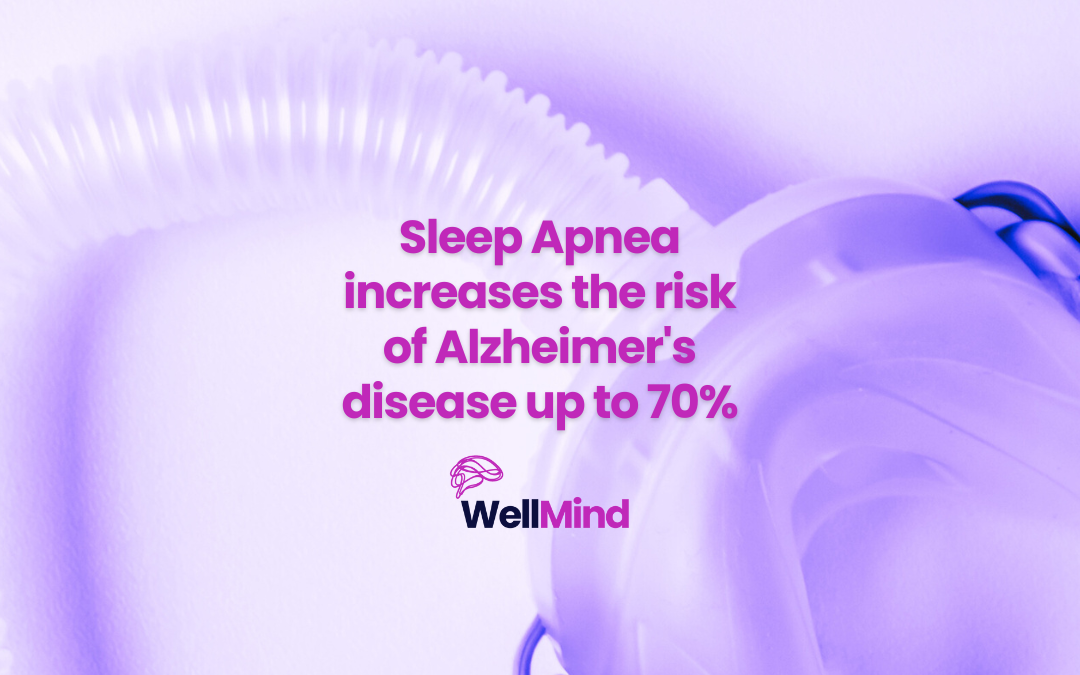Sleep apnea, a sleep disorder characterized by pauses in breathing or shallow breaths during sleep, affects millions worldwide. While it might seem like just a nighttime inconvenience, the consequences of untreated sleep apnea extend far beyond disrupted rest. One of the most concerning relationships emerging in recent research is the link between sleep apnea and Alzheimer’s disease. Understanding what causes sleep apnea, how to prevent it, and its connection to cognitive decline is vital for preserving both short-term health and long-term brain function.
What Is Sleep Apnea?
Sleep apnea is typically divided into three categories:
- Obstructive Sleep Apnea (OSA): The most common form, OSA occurs when the throat muscles relax excessively during sleep, causing airway blockage. This leads to intermittent pauses in breathing, sometimes lasting several seconds.
- Central Sleep Apnea (CSA): Unlike OSA, CSA occurs when the brain fails to send proper signals to the muscles responsible for breathing. This type of sleep apnea is less common and often associated with medical conditions affecting the central nervous system.
- Complex Sleep Apnea Syndrome: Also known as treatment-emergent central sleep apnea, this occurs when a person has both obstructive and central sleep apnea.
Causes of Sleep Apnea
Several factors contribute to the development of sleep apnea, particularly OSA. These include:
- Excess Weight: One of the strongest risk factors for OSA is obesity. Excess fat around the neck can increase pressure on the upper airway, making it more prone to collapse during sleep. Research shows that even modest weight loss can significantly improve symptoms.
- Anatomical Features: Structural differences in the airway, such as a narrow throat, enlarged tonsils, or a deviated septum, can make individuals more susceptible to sleep apnea.
- Age and Gender: Sleep apnea becomes more common as people age. Men are also more likely to develop sleep apnea, although post-menopausal women experience a heightened risk.
- Family History: A genetic predisposition can increase the likelihood of developing sleep apnea. If close family members have the condition, it may increase your risk.
- Lifestyle Factors: Smoking, alcohol consumption, and certain medications can exacerbate sleep apnea symptoms. Smoking, in particular, increases inflammation and fluid retention in the upper airway.
- Chronic Medical Conditions: Heart disease, type 2 diabetes, and hypertension are commonly associated with sleep apnea. These conditions can worsen sleep apnea symptoms and vice versa.
Preventing Sleep Apnea
While not all risk factors for sleep apnea are within one’s control, several lifestyle changes and strategies can reduce the likelihood of developing or worsening sleep apnea:
- Maintain a Healthy Weight: Weight loss is a key intervention for individuals with OSA. Studies show that losing even 10% of body weight can result in significant reductions in the severity of sleep apnea. A balanced diet and regular exercise can help manage weight effectively.
- Sleep Position: Sleeping on your back can exacerbate OSA by allowing the tongue and soft palate to collapse into the airway. Side sleeping is often recommended to keep the airway open.
- Avoid Alcohol and Sedatives: Both alcohol and sedative medications can relax the muscles of the throat, increasing the risk of airway obstruction. Limiting their use, particularly in the evening, can help reduce sleep apnea episodes.
- Quit Smoking: Smoking can contribute to inflammation and fluid retention in the airways, worsening OSA symptoms. Quitting smoking is not only beneficial for sleep apnea but also improves overall respiratory and cardiovascular health.
- Treat Nasal Congestion: Chronic nasal congestion can lead to difficulty breathing during sleep. Addressing underlying conditions like allergies or using a nasal decongestant or saline spray can improve airflow.
- Regular Exercise: Engaging in regular physical activity, even without significant weight loss, can help improve sleep quality and reduce the risk of OSA. Exercise can strengthen the muscles involved in breathing and improve overall cardiovascular health.
- Use a Continuous Positive Airway Pressure (CPAP) Machine: For individuals diagnosed with moderate to severe OSA, a CPAP machine can be life-changing. It provides a steady stream of air to keep the airway open during sleep.
Sleep Apnea and Alzheimer’s Disease: What’s the Connection?
While sleep apnea’s effects on daytime fatigue, cardiovascular health, and overall well-being are well-known, researchers are increasingly focused on its relationship with cognitive decline, particularly Alzheimer’s disease. Alzheimer’s, a progressive neurodegenerative disorder that affects memory and thinking, is the leading cause of dementia in older adults. The potential link between these two conditions lies in how sleep apnea impacts the brain over time.
- Chronic Oxygen Deprivation: In OSA, repeated pauses in breathing lead to temporary drops in blood oxygen levels (hypoxia). Chronic hypoxia can impair brain function and damage neural tissues, particularly in areas like the hippocampus, which is crucial for memory formation.
- Disrupted Sleep Architecture: Sleep apnea fragments sleep cycles, reducing the amount of time spent in deeper stages of restorative sleep. These deep stages, especially slow-wave sleep (SWS), are crucial for memory consolidation and brain repair. Disrupted sleep can impair the brain’s ability to clear out waste products, including beta-amyloid, a protein associated with Alzheimer’s.
- Increased Beta-Amyloid Accumulation: One of the hallmarks of Alzheimer’s disease is the buildup of beta-amyloid plaques in the brain. Research suggests that sleep disturbances, like those caused by sleep apnea, can accelerate the accumulation of these plaques. A 2017 study published in the American Journal of Respiratory and Critical Care Medicine found that individuals with untreated OSA had higher levels of beta-amyloid in the brain compared to those without the condition .
- Inflammation and Cardiovascular Impact: Sleep apnea triggers systemic inflammation and increases the risk of cardiovascular problems, including hypertension and stroke. Both inflammation and vascular issues are known contributors to Alzheimer’s disease. Inflammatory markers have been found in higher concentrations in people with OSA, and studies suggest that this chronic inflammation may accelerate neurodegenerative processes.
Preventing Cognitive Decline in Sleep Apnea Patients
Given the relationship between sleep apnea and Alzheimer’s disease, addressing sleep apnea may play a role in preventing cognitive decline. Here are some strategies for mitigating this risk:
- Early Diagnosis and Treatment: If you suspect sleep apnea, seek medical advice. An early diagnosis, followed by treatment, can reduce the long-term impacts of oxygen deprivation and sleep fragmentation on the brain. Sleep studies (polysomnography) are the gold standard for diagnosing sleep apnea.
- Consistent Use of CPAP Therapy: For individuals with diagnosed OSA, CPAP therapy can dramatically improve oxygen levels and sleep quality, potentially reducing the risk of beta-amyloid accumulation. A 2019 study published in JAMA Neurology found that older adults who used CPAP consistently had a lower risk of developing dementia .
- Focus on Sleep Quality: Improving overall sleep hygiene can benefit both sleep apnea symptoms and cognitive health. This includes maintaining a regular sleep schedule, creating a comfortable sleep environment, and minimizing exposure to screens before bed.
- Manage Cardiovascular Health: Since sleep apnea can contribute to heart disease and stroke, managing cardiovascular risk factors like hypertension, cholesterol, and diabetes is crucial. Doing so not only helps with sleep apnea but also supports brain health.
- Monitor Cognitive Function: Individuals with sleep apnea should regularly monitor their cognitive health. Memory loss, confusion, or difficulty concentrating could signal early cognitive decline. If these symptoms appear, discussing them with a healthcare provider can lead to early intervention.
Conclusion
Sleep apnea is more than just a nighttime disturbance—it can have significant consequences for both physical and cognitive health. The emerging link between sleep apnea and Alzheimer’s disease underscores the importance of understanding the causes and prevention of this sleep disorder. By managing risk factors, seeking treatment, and maintaining healthy lifestyle habits, individuals with sleep apnea can protect their brain health and potentially reduce the risk of Alzheimer’s disease.
It’s important to stay informed about the latest advancements in brain health. Understanding the risks and getting ahead of the condition can make a significant difference in your health. To gain deeper insights into Alzheimer’s, consider exploring WellMind. This advanced test provide valuable information empowering you and your provider to make informed decisions.
Sources:
- American Journal of Respiratory and Critical Care Medicine. “Sleep Apnea and Beta-Amyloid Buildup.” 2017.
- JAMA Neurology. “Effect of CPAP Therapy on Cognitive Decline.” 2019.
- National Sleep Foundation. “Sleep Apnea Symptoms and Risk Factors.” 2023.
- Alzheimer’s Association. “How Sleep Impacts Brain Health.” 2023.







